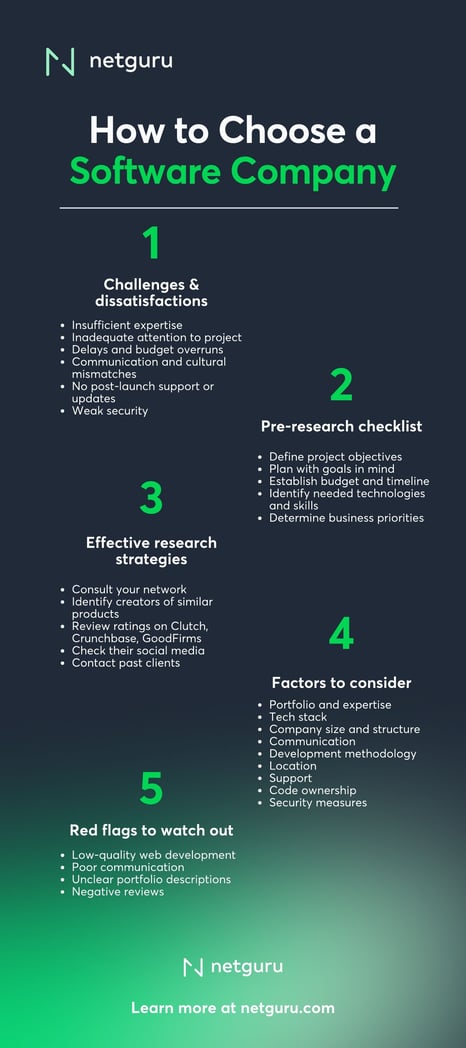How to Choose a Software Development Company and Avoid Dissatisfaction

Looking for the right software development company
Choosing the right software development partner is not an easy task, as there are many potential options to choose from –over 30,000 on Clutch alone.
Moreover, when evaluating potential partners, it’s important to consider numerous factors. The need to make a quick decision shouldn’t compromise the quality of your choice, as selecting the wrong outsourcing partner could lead to significant time and financial losses for your company.
So, how can you minimize that risk? It’s crucial to clearly define your requirements to reduce the risk and increase the chances of finding the best software development company.
Common challenges and dissatisfactions can include:
-
Lack of expertise in the necessary technology or business area.
-
The software development firm not giving your project the attention it requires.
-
Going over deadline and budget.
-
Poor communication, culture mismatch, timezone issues.
-
No tech support after launch, inability to update.
-
Lax security.
In this article, we’ll guide you through factors to consider, the common hurdles that clients face when searching for the best IT outsourcing company, and the strategies to overcome them.
Understanding your project requirements
Before starting your search for a reliable software development company, you need to have clarity about your project: its goals, scope, and technical requirements. This clarity is crucial for the success of your software project and business growth.
Having only a vague idea of what you’re looking for will make it difficult to narrow down the list of potential agencies to work with and communicate your needs effectively.
Consider the following before beginning your search:
-
Define the project objectives: Start by mapping out the results you aim for: what problems do you want to solve with the development project, and how will it help you meet your business goals?
-
Make a goal-oriented design plan: One of the crucial parts of the preparation might be answering the question of why you need this software, not how or what it is. Focus here on your business goals and how the new product will benefit your customers.
-
Set the budget and timeline: Financial and time constraints will greatly influence the scope of the project. At the same time, communicating them clearly to potential software development companies will make everyone’s expectations clear, help you come up with a more realistic budget and deadlines, and set you up for honest collaboration.
-
List technologies and skills required: You don’t need to know all the details, but it’s helpful to have a general idea of the technical requirements of the project to find companies with the necessary technical skills and experience to turn your idea into reality. Anything left unclear will likely be misinterpreted, resulting in superfluous work, unmet deadlines, and wasted money.
-
List priorities: Do you need a website, a mobile app, or both? Which features are essential for your business? It’s helpful to focus on the most important aspects of the product; otherwise, you might get overwhelmed trying to fit everything in.
Going through all these steps before you even start searching will yield results later on: not only will you narrow down your search criteria, but you will also receive more precise quotations for the work that needs to be done from potential software development partners.
The importance of research in finding the right partner
Through research, you'll ensure that the companies you're considering are reputable and capable of delivering on the promises they make, and that they are the right fit for your project.
What are the best strategies for conducting effective research?
- Ask your network: Getting a recommendation from a trusted source is the best-case scenario. If someone you know and trust has worked with a software development company and can give you an honest review, that’s fantastic.
- See who has created products similar to the ones you want: This will help you eliminate others that might be great but not skilled or experienced in the right area.
- Read their Clutch reviews and check the ratings on Crunchbase, GoodFirms, etc.: Previous clients offer insights into the agency's strengths and weaknesses, providing a balanced view of their capabilities.
- Check their social media channels: Assess if they maintain active communities and observe their interaction style. This will reveal their communication approach and highlight their accomplishments.
- Contact clients that the software development company has worked with before: Speaking directly to former clients can provide a clear picture of the company's reliability, quality of work, and the long-term success of their past projects.
Once you have vetted the companies on your initial list, considering the following factors should help you pick the best candidate.
Vetting the Company's Expertise
Technical Interviews and Code Reviews
Conducting technical interviews and requesting code samples or access to repositories like GitHub from potential partners is crucial. During these interviews, evaluate not only the quality of their code but also their coding style and problem-solving approach. Look for clean, well-documented code and solutions that demonstrate an in-depth understanding of your specific technical requirements.
Certifications and Training
Consider the importance of relevant certifications, such as those from AWS, Microsoft, or in Agile methodologies. These certifications indicate a commitment to maintaining high standards and staying current with industry best practices. Additionally, ensure that the company invests in ongoing training programs. Continuous education helps their team stay updated with the latest technologies and methodologies, enhancing their ability to deliver innovative and reliable solutions for your project.
Factors to consider when choosing a software development company
Portfolio and expertise
A potential software development partner should have a proven track record of successfully completing IT projects and bringing products to market.
Look for companies that have built products similar to what you're looking for and can demonstrate it.
They should be able to support any claims of expertise or experience with examples, and you should be able to test their publicly available products, read customer reviews and user ratings, and contact their clients about their experience working together.
Relevant industry expertise
It’s important that the software development company you choose should have a solid understanding of your specific business challenges and target market.
Companies with significant experience working in your industry will have acquired valuable business knowledge in addition to technical expertise.
Do they have experience working with clients in your industry or related fields and understand your target market? Look for companies that won’t just follow your requirements, but ones you can rely on to provide expert advice along every step of the software development process.
Tech stack
The final decision on which software development company to choose will be greatly influenced by the tech stack they use. There are many factors to consider, such as the programming languages, frameworks, libraries, and databases the company employs in the development process. Not all of them will be relevant to your project requirements.
For example, if you're looking for robust backend development, your potential partner should have expertise in Node.js, Python, or Java. If frontend development is your priority, check their proficiency with frameworks such as Angular, React, or Vue.js. In any case, the technologies the agency uses should align with your concept in terms of the development process, your scalability goals, and future maintenance needs.
Company size and structure
Why is that important? A lot in the development process depends on the software company's size. A larger one will usually offer better stability, a larger pool of talent, and a broader tech stack. This, in turn, might assist in scaling your project in the future. They will also be more likely to have a wider range of services and better-established processes for project management and communication than a smaller company.
However, a smaller company has its advantages, too. They will likely provide more personalized attention. Consider whether you want to outsource to a large corporation, a mid-sized firm, or a boutique agency. Your project will benefit if the company's structure aligns with your goals and preferences.
Communication
The best development team won't be your dream team if they're not communicating with you effectively.
Communication should include regular progress updates and clear documentation on the project. Are they reporting any problems in time? Evaluate if the frequency and style of their communication correspond to your preferences. Are they responding quickly enough? If they're located in a different time zone than yours or if the team is distributed across different time zones, that might slow down information exchange during the development process.
Additionally, inquire about their project management methodologies and the ways they facilitate communication and collaboration between team members.
Development methodology
The Agile development methodology is the most popular among software development companies, and for good reason. Its advantages include increased flexibility and regular feedback loops, enabling frequent adjustments. This makes it especially suitable for projects with dynamically changing requirements. Check what kind of Agile methodology the company uses: Scrum, Kanban, Lean, etc.
Another common development methodology, Waterfall, might be more appropriate for projects with well-defined scopes and sequential development phases.
Analyze which one fits the nature of your project better, ensure they are experienced in using them, and verify that they are familiar with best practices.
Location
In our globalized world, where you can outsource services to a software company on the other side of the planet to reduce costs, time zone differences might seem like a minor issue. However, don't underestimate their impact. If managed poorly, they can significantly delay communication.
That's why it's important to set up tools and communication practices that can leverage these differences. Moreover, with the right approach, time zone differences can work to your advantage. For instance, if your company is based in the US and your outsourcing partner is in Europe, you can give your feedback at the end of your day, and the European company will have the adjustments ready before you wake up the next day.
Choosing between nearshoring and offshoring requires careful consideration of their benefits and drawbacks to best suit your project's requirements.
Support
Check if the software company will provide tech support, updates to your product post-launch, and software maintenance. Technologies evolve very quickly, and you don’t want to risk your product becoming obsolete if it doesn’t receive regular updates.
Ownership of code
When you're at the beginning of product development, you might not think about how you might be changing your software years from now. However, it's very important to know who will own the code written for your product. If the software service provider retains the rights to the source code, it will be difficult for you to make updates, and you'll need to pay a licensing fee.
Proper security measures
Outsourcing the development service must go hand in hand with the protection of your sensitive information and intellectual property.
Ensure the software developer follows the highest industry standards, such as OWASP (The Open Web Application Security Project) guidelines, and that they have vulnerability management processes in place, so potential threats are assessed continuously.
You also want to know about their experience with implementing security features such as authentication, authorization, and data encryption.
Red flags to watch out for in software development companies
- Poor quality web development: A software developer with an outdated or poorly functioning website? That’s more than a red flag—it's a clear “run the other way” sign.
- Poor communication: If they don’t pay attention to your needs and requirements during the sales process or can’t get back to you in a timely manner, chances are that won’t change once you’re already their client.
- Vague company portfolio descriptions: If a software company claims to have experience doing something similar to what you’re looking for but can’t share any information, be cautious.
- Bad reviews: This one seems obvious but is easy to ignore if the developer excels in other areas. Yet, if many previous clients had a bad experience with them, chances are you won’t be satisfied either.

Common software outsourcing problems
Again and again, companies reach out to us because their collaboration with another software development agency left them dissatisfied. What are the most common reasons?
- Cultural differences and language issues: During the software development process, when you're delving into the details of your product, you don't want those details to be lost in translation, literally. Opt for companies with high communication skills.
- Significant time zone difference: If you are in Europe and your outsourcing partner is in Asia, the time you can work together will be limited. Ensure the company has extensive experience with offshore development and implements adequate processes to manage the time zone difference.
- Unexpected costs: Obviously, you want to spend a reasonable amount of money, but sometimes choosing the cheapest solution might come with additional costs, like the need to fix bugs, difficulties with further development of the project, or implementing updates. If there are delays or additional fees, you'll end up paying more than with a fixed price model.
- Data leaks: It's better to prevent them than to fix them later. Consider how your data will be handled and avoid software development companies that don't have clear data processing procedures and do not follow GDPR, which is the strongest privacy law globally.
- Lack of control: Even though you're outsourcing your software development, it's likely you want to maintain some level of control over the final product. The same goes for the development process: check beforehand how much influence over it you'll be able to keep.
How to choose a software development company — conclusions
At Netguru, we often work with clients who come to us because they are not satisfied with their current software company. By the time they reach out to us, the project is already suffering from delays and is not in great shape.
In many cases, this could have been avoided. That's why it's important you invest your time in the process of looking for the right custom software development company. Start with understanding your own product to be able to clearly communicate your requirements. Do extensive research, considering the strengths and weaknesses of each potential company, and how different factors might affect your collaboration.
Choosing the right software development partner will ultimately save you time and money, and leave you with a high-quality software product tailored to your specific business needs.







